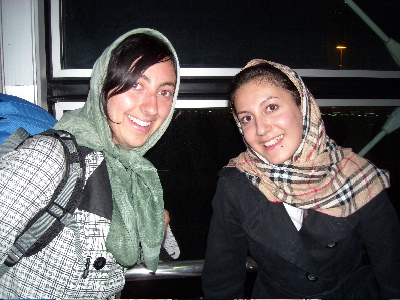WINSTON-SALEM JOURNAL Sunday, May 18, 2008
Section: A Edition: METRO
Page: 23 Column: John Railey

Debra Dillard (left) and an Iranian Friend
LOCAL WOMAN WON'T LET SABER RATTLING DROWN OUT IRANIAN VOICES
Debra Dillard of Winston-Salem went to Iran last month to make new friends.
That sounds pretty crazy, doesn't it?
About as crazy as Sen. John McCain, the presumptive Republican nominee
for president, singing "Bomb, bomb, bomb .bomb, bomb Iran" last
year - even as America troops were paying the ultimate price for
the poorly planned Iraq war, just across the border from Iran. And
they're still paying the price.
About as crazy as Sen. Hillary Clinton, campaigning in Pennsylvania
last month for the Democratic presidential nomination, responding to a
question about what she would do if Iran attacked Israel with nuclear
weapons: "I want the Iranians to know that if I'm the president, we
will attack Iran. In the next 10 years, during which they might
foolishly consider launching an attack on Israel, we would be able to
totally obliterate them."
She sounded like she was talking more to the Iranian people than to their president, Mahmoud Ahmadinejad.
Dillard, a 27-year-old Salem College graduate, was hanging out among
the Iranian people in Iran last month when she heard about Clinton's
words. She said that most of the Iranians she met while traveling with
Neighbors East and West (a small, grass-roots citizens' group from
America) were friendly and smart enough to differentiate between
Americans and their leaders. They know all Americans aren't like
President Bush, they told her, just as all Iranians aren't like
Ahmadinejad.
"We can't sit around and let our government, let our administration
speak for us," said Dillard, who is the peace and justice coordinator
for the Greensboro office of the American Friends Service Committee, a
Quaker group. "If our government refuses to have a direct talk with the
government of Iran, then the people are taking on the role of being the
diplomats."
After all, Ahmadinejad does have a dismal record on human rights. It's
easy to hear or read his hate-filled speeches and know he's not a nice
guy. We could dismiss him as a wacky hatemonger if the threat he poses
to Israel weren't all too real.
But what are the Iranian people like?
Dillard, armed only with gifts of artwork from Winston-Salem students
and knitted items gathered by Quakers in High Point, had the guts to
try to find out.
"It was peacemaking, peace-building, friendship-building," she said.
Group members raised their own money for the two-week trip. They had a
few Iranian contacts before they left, Dillard said, and met a lot more
in the country. They had guides, she said, but they were travel guides,
not "minders" checking up on them as they drove past snow-capped
mountains and lush gardens.
She never felt that she was in danger, she said. In fact, she said, the
Iranians were anxious to meet and talk with her and her friends. The
group visited with Iranians and exchanged e-mail addresses with them.
And in November, she said, her group hopes to return to Iran. She might
not be with the group then, she said, but she does hope to return to
Iran one day.
Individuals who brave trips to countries their governments are opposed
to can usually find kindred spirits. We all know that governments wage
wars, not individual citizens. And there's sure no end to war. A mighty
chorus of citizen voices can end a long-running war, but such choruses
never form in time to prevent a pending war.
So friendship missions such as Dillard's probably sound crazy to many Americans.
But they're nowhere near as crazy as the very real prospect of America
spending thousands of lives and trillions of dollars on another war in
the Middle East, one with Iran.
- John Railey writes local editorials for the Journal.
He can be reached at jrailey@wsjournal.com.
